Musician: SUSAN GIBSON
Video: “Imaginary Lines”
SUSAN GIBSON AT BLUE ROCK ALIVE! COOL NIGHTS 2020 THIS FRIDAY, NOVEMBER 27
Susan Gibson had just left home for her third freshman year in college, but it was the first time she actually moved away from home. After her first Christmas home, she was emotional about going back to college and all that angst spilled out of her at her Mom’s kitchen table. In those 15 minutes, her life was changed. The Chicks (previously known as Dixie Chicks) took Gibson’s “Wide Open Spaces” to No. 1 on the Top Country Albums charts in 1998 and made it one of the biggest country songs of all time—and it earned them the coveted Best Country Album Grammy.
Susan Gibson will be featured at the Blue Rock aLive! Cool Nights 2020 virtual concert series this Friday, November 27. The series is “for the songs, for the artists, for all of us.” You can buy a Season Pass for only $105—and have a seat in the house by sending in your headshot. They will place the large headshot on a seat, so you will literally be sitting in the room.
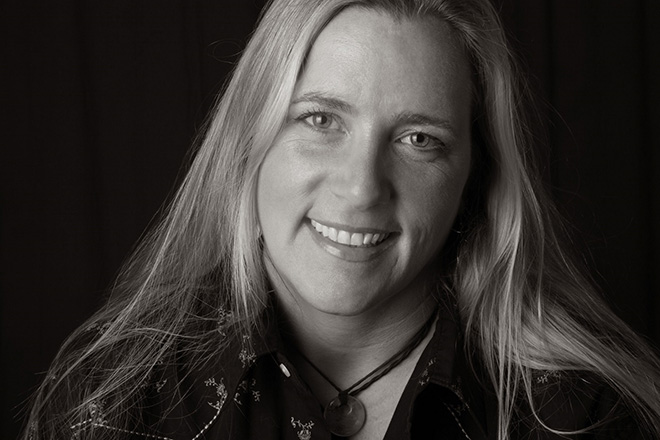
Photo credit Todd Wolfson
Blue Rock’s innovation, quality and creativity is evidenced in concerts produced with broadcast quality audio-video from their renowned Texas room—streamed straight to you. Individual tickets can also be purchased for $25: https://bluerocktexas.com/events.
Susan Gibson writes with unwavering honesty—without boundaries and without any lines that crowd her or define her music. It allows her speak her truth and be fiercely independent.
We talked with Susan Gibson about her songs that empower women and allow listeners to embrace their independence, her unconventional approach to songwriting, how hard work and determination continues to pay off, how she needs “wide open spaces and room to make big mistakes” and what helps her remain hopeful and content.
SUSAN GIBSON Interview
with M Music & Musicians magazine publisher, Merlin David
Tell us how the idea of “Imaginary Lines” came to you.
“Imaginary Lines” was a song I wrote with my friend, Jana Pochop—who also made the video. She was my right-hand gal for 12 or 13 years. I had the idea and the first verse after a long tour she did with me. I was staring at those lines on the highway and thinking that we all agree to respect those lines. Even though they are just painted on the road, we treat them as if they are concrete barriers. I brought the idea to Jana and we started brainstorming on all the other lines that are real and not real—state lines, dotted lines. One day on our day off, we pulled out a couple of blankets at a park in Taos, N.M. and wrote this song together.
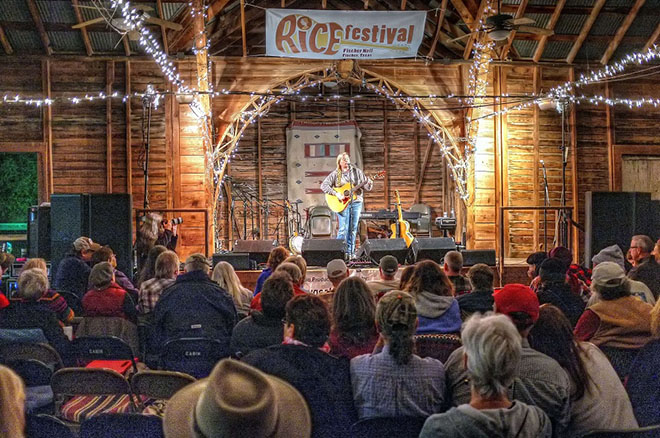
Photo credit Dave Hensley
What did you learn about yourself after recording 2019’s The Hard Stuff?
It’s my most recent album recorded with André Moran as the producer at The Congress House Studio in Austin, Texas. I learned that I really love getting to hand my raw songs to someone whose musicianship and perspective I admire. Taking my hands off of it—not micro-managing the recording. I recorded my parts on that record with the bass player, drummer and André on guitar and then I left to go on tour. He would send me files of the tracks and we’d talk about them, but sonically that record is mostly André’s interpretation of the songs—and I love it. It came out so much better than if I was making every decision on it.
Who originally inspired you to write songs?
My first songwriting hero was Shawn Colvin. I was learning to play guitar and had a friend that gave me Shawn’s Steady On songbook with the tablature. That record is my time machine. I loved that album. She’s the first that I remember thinking—I know something about her by listening to the songs. There was an exposure there that I didn’t pick up on from anyone else. Also, the alternate tunings that she used blew my mind and my guitar playing wide open.
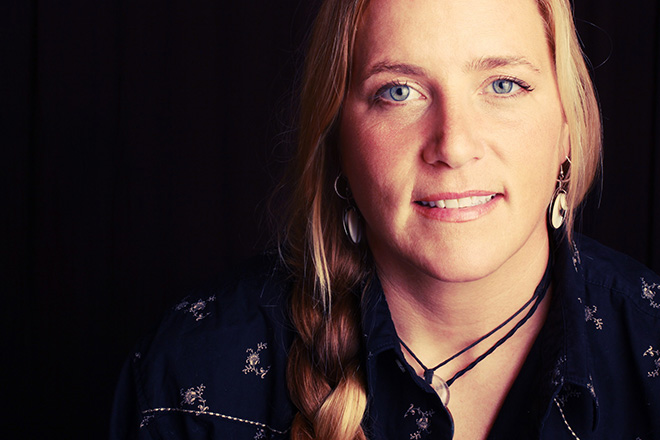
Photo credit Todd Wolfson
What songwriting tip would you like to offer?
I’m going to say this because I need to hear it: You cannot fix a blank page. I have not been writing a lot lately, especially given how much time and material there is to write about right now. I was just thinking about this when I was getting ready to talk with you. I was having a campfire in the back of my house and I cut some branches. I realized something about my songwriting that is similar to building a fire. Sometimes, I’m trying to burn green wood. There’s so much to write about—the whole planet. There is always a lot, but this year seems particularly fraught with stuff to make you feel introspective—with so much time for reflection. It feels like I have a ton of green wood sitting around. I’m waiting for it to dry out a little, so I can light it and make it burn. That reasoning sounds good in my head, but the reality is—if it wasn’t that excuse, I would use another one not to write. (Laughs) But as soon as you get something down on paper, you can work with it. If you don’t write anything down, you don’t have anything to work with. I need to hear myself say that out loud so I can get to work.
How did the idea for “Wide Open Spaces” come to you?
That was a total autobiography. I had just left home for my third freshman year in college—although it was the first one that I had actually moved away from home. I wrote that in a ‘flurrious’ (I’m coining a new term here) 15 minutes at my Mom’s kitchen table—my first Christmas home from college. I went back to college without that notebook. My Mom later sent it to me along with a care package.
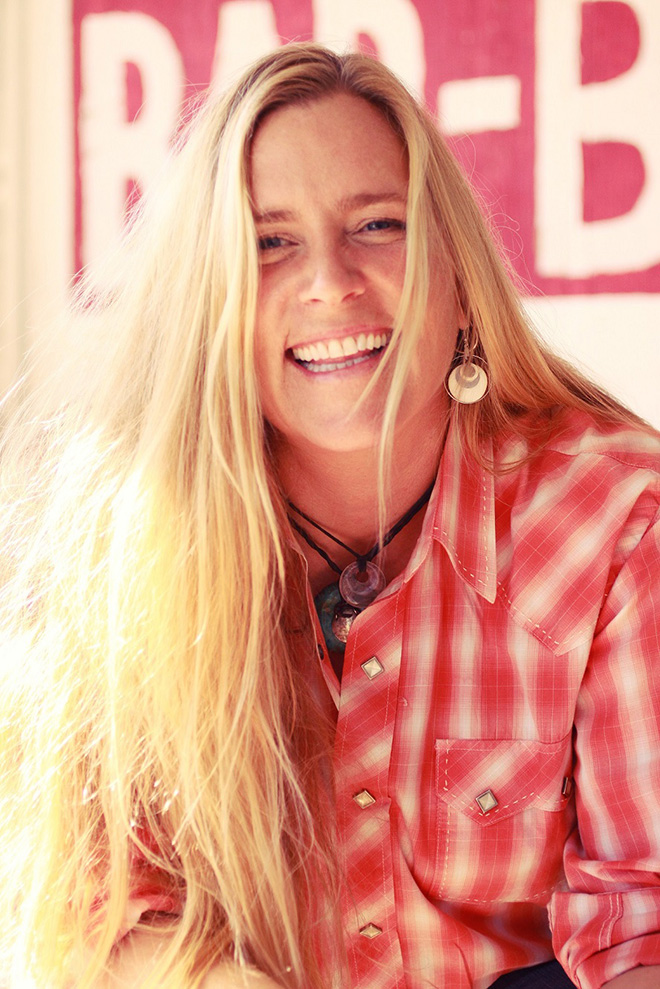
Photo credit Todd Wolfson
Do you believe that your Mom sending you that notebook was all part of the big plan in your life?
I absolutely believe we have free will, but we also have these little nudges that are so gentle (and some big shoves in the middle of your back) that you can’t help but take a step forward. My Mom sending me the notebook—provided a circle of that song bringing me the independence that I am singing about. The beautiful jelly-filled hole of that donut is my Mom finding that notebook that I’d forgotten about and sending it to me in a care package—when I was away at school. I felt better after writing those lyrics at my parents’ home and so I forgot about it. It wasn’t bouncing around in my head anymore. My Mom finding those lyrics and thinking, ‘Huh! She might want to have this back’—that is amazing. I certainly wouldn’t have remembered those lyrics.
You’ve talked about this song for 22+ years. Is there something new that comes to mind?
I have still yet to record that song by myself in a studio. I might now. I don’t know. I’ve asked Lloyd Maines to help me do an acoustic treatment of the song. It might be the best way to approach it—because he’s the one who started the ball rolling. There is a live version of the song, and that’s my Dad yelling, “Check the oil.” I don’t like going back to listen to my recordings after they’re done. You listen to it so much while recording that you’re pretty much done with it after recording it. But because that’s my Dad’s voice on that live recording—it’s so special. For all the reasons why that song is special to me, that is the biggest thing. After my Mom passed away, he was at that gig. Dad has zero musical ability, yet he yelled it out right on cue. It just makes me smile because he nailed it. Old one-take Walt gets it done right there at the Bugle Boy in La Grange, Texas. “Wide Open Spaces” was such a freak event. I equate it to shooting a basketball from Amarillo, TX and making that basket in Nashville, TN—blindfolded, backwards, granny shot.
Which Top 5 Musicians inspired you to become a musician?
Nancy Sue Ellison Gibson, Shawn Colvin, Emily Saliers, Suzanne Vega, Bob Merkett.
What are your Top 5 favorite albums of all time?
Steady On (1989) — Shawn Colvin
Solitude Standing (1987) — Suzanne Vega
Great Big Boy (1991) — Leo Kottke
Blind Man’s Zoo (1989) — 10,000 Maniacs
Greatest Hits (1973) — John Denver
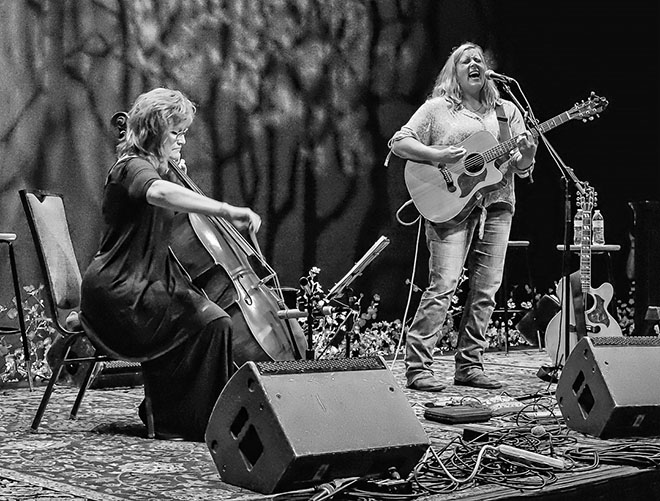
Photo credit Dave Hensley
What instruments can you not live without?
I have a Gibson, of course. (Laughs) I have an acoustic Gibson CL-35 and an acoustic-electric Gibson EC-30. I got it in 1998 around the time I got my first royalty check. I was in Amarillo, Texas at an authorized Gibson dealer, Randy’s Music Mart. They only had 3 or 4 Gibsons. I bought it because they were Gibson and because it made my hair look good. It matched highlights in my hair. True story. Probably also because it made my butt look smaller. (Laughs)
Tell us a “pinch me” moment when you thought “Wow, this is really happening to me!”
The Chicks (then, Dixie Chicks) opened for our band, The Groobees, at our CD release party in Amarillo, Texas in June 1997. They hadn’t released “Wide Open Spaces” yet, but it was on the horizon and it was such a surreal experience to share a show with them.
Where were you the first time you heard “Wide Open Spaces” on the radio?
The first time I heard the Chicks’ recording was when Michael Tarabay (Natalie Maines’ first husband) had a demo of it. We sat at the back of his Suburban outside of Kyle’s 88 Key Café in Lubbock, Texas (now The Blue Light) and listened to it on a cassette tape. It just made me bawl. I couldn’t believe it. But the first time I heard it in the wild (on the radio) was when I was out in California playing gigs. My, Yvonne Perea, was helping me get around because I’m not suited for Los Angeles traffic. We were driving down Beach Blvd in Huntington Beach when the song came on the radio. I initially thought, ‘this sounds familiar.’ (Laughs) As soon as I heard the first line of the lyrics, I had a slight gasp. Then, we immediately rolled down the car windows and screamed, “I love this song!”
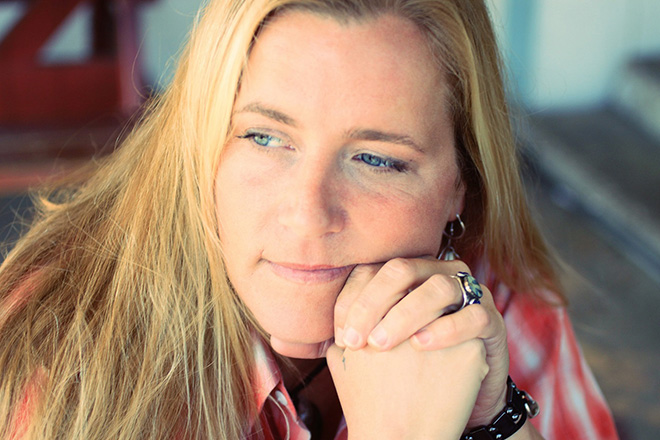
Photo credit Todd Wolfson
What is the best advice someone has given you?
Lloyd Maines told us to never get a tour bus and to hold on to our publishing as long as possible.
What’s the best advice you’d like to give your teenage self?
Don’t start smoking cigarettes. Don’t try to change the way you feel. I had a healthy way to deal with the way I felt—that’s what writing was for me. But I also had trouble with trying to change the way I feel—smoking, drinking, eating, Amazon Prime, Netflix. All of that stuff. All of it is danger for me. I have to tell myself—go ahead and feel it rather than avoid it. Don’t try to change it. Just feel and write about it.
Why is playing at Blue Rock so special?
The place is gorgeous. Billy and Dodee Crockett have made it their mission statement, with every detail. Everyone who comes there feels welcome and received. Whether it’s your first time or you always come there. They have an ethos about that place. The mission of Blue Rock is a one-on-one sense of openness. If I had that place, I’d be so protective and territorial. I probably wouldn’t let anyone come there. (Laughs) But they are so welcoming. And they do these types of events so others can experience community.
How do you remain hopeful in this strange and unique socio-political time?
I talk to my niece and nephew and they always make me feel better about the future.
Where can new fans get more info and stay updated?
www.SusanGibson.com
Instagram: @susangibsonmusic
Twitter: @susannng
Facebook.com/susannng/

Photo credit Todd Wolfson



comment closed